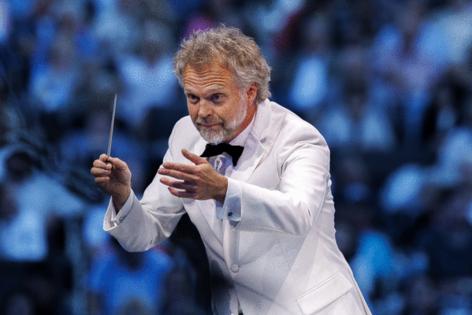Empty seats, no Dudamel: LA Phil opens its Hollywood Bowl season on somber notes
Published in Entertainment News
LOS ANGELES — Tuesday night the Los Angeles Philharmonic opened its 103rd season at the Hollywood Bowl. It was a beautiful evening. Lustrous twilight. Bright moon. Paradisal weather. Unusually light traffic. A program featuring Rachmaninoff and Prokofiev favorites. Cares could easily slip away once walking through welcoming and efficient security.
Still, the real world is never far away from the Bowl. One of the highlights of this season has fallen victim to a baffling Venezuela travel ban. Gustavo Dudamel can no longer bring his Simón Bolivar Symphony Orchestra in August. That now means that Dudamel will spend only a single week at the Bowl during his penultimate summer as L.A. Phil music director.
Some of the Bowl's facilities have been dolled up a bit, but the amphitheater feels fragile after the January wildfires. The military on our streets has produced an L.A. edginess. Could that have contributed to the Bowl's unusually low opening-night attendance? Ticket sales were said to have been strong, making the many empty seats worrisome no-shows.
What Tuesday night did herald was an L.A. Phil summer season with fewer splashy events than usual (no opera, for one), several conductors making their Bowl debuts and a good deal of Russian music. It was, moreover, a Tuesday that proved a relatively somber occasion, which, despite the lovely atmosphere, fit the mood of the times.
Danish conductor and Minnesota Orchestra Music Director Thomas Sondergard made his L.A. Phil debut. There is temptation to place every debut, along with every conductor invited back to the Bowl, as a potential candidate for the long list, short list or whatever list to be the L.A. Phil's next music director after Dudamel departs for New York next year. But Bowl concerts tend to be hit-and-run events.
Sondergard demonstrated a sense of grandeur, sometimes shattering, other times starchy. But there were all the opening-night kinks to be worked out with audio, video, an orchestra just coming back from vacation and coping with minimal rehearsal time.
None of this played into Sondergard's or the Bowl's strengths as Samuel Coleridge-Taylor's Ballade in A Minor opened the program. The bland Ballade is a lesser score by the late 19th and early 20th century British composer who deserves a revival for his more substantial works.
For Rachmaninoff's Rhapsody on a Theme of Paganini, the subdued blue shell lighting suddenly turned a shockingly vivid orange. Amplification met the glaring illumination with the evening's piano soloist, Kirill Gerstein, unnaturally dominating a sonically repressed orchestra. The video monitors went their own crazy way, whether unmusically flipping from close-ups of fingers and lips or attempting surreal cornball special effects.
It was all too much (and in the orchestra's case, too little), but Gerstein is a gripping pianist in any situation. He has just released an iridescent recording of a piece written for him and vibraphonist Gary Burton by the late jazz great Chick Corea. Thomas Adés wrote his heady Piano Concerto for him. Of all the great recordings of Rachmaninoff's over-recorded Second Piano Concerto, Gerstein's recent one with the Berlin Philharmonic may be the most powerful.
Every note, important or incidental, he hit in the Rhapsody had a purposeful intensity. What you could hear of Sondergard's contribution was a starkly effective percussive response from the orchestra. It was, under any conditions, a striking performance.
Video and audio settled down for Prokofiev's Fifth Symphony, which was written in 1944, a decade after Rachmaninoff wrote his Rhapsody. The world had momentously changed in those 10 years.
Both composers fled Russia after the 1917 revolution, but their relationships with their native land was very different. Although Rachmaninoff never returned, he remained thoroughly old-world Russian. He wrote his Rhapsody in idyllic Switzerland, before immigrating to the U.S., where he died in Beverly Hills in 1943.
Prokofiev spent years in Paris and in the U.S. as a modernist, but ultimately Mother Russia was too strong of a pull, and he returned despite the artistic restrictions of Stalinist Russia. His Fifth is a war symphony, written at a time of great nationalism, and it premiered in Moscow in January 1945 just after Russia had routed the Nazi invaders.
Sondergard's performance lacked the soul of, say, André Previn. (Previn performed the Fifth at his first concert as L.A. Phil music director in 1985). Here, threatening thunder of the monumental first movement was followed by threatening lightning in the faster scherzo followed by the threateningly dark cloudy skies in the slow movement followed by the victorious bombing of the final movement.
The overpowering bigness of this performance happened on the day that the U.S. reaffirmed its commitment to Ukraine in its war with Russia. Three years ago, some questioned whether Russian music should be performed at all. Several other orchestras canceled performances of Tchaikovsky's "1812 Overture." The Bowl's annual "Tchaikovsky Spectacular" retained the Overture although the program began with the Ukrainian national anthem.
This summer Russian music abounds at the Bowl with the usual Tchaikovsky, a full week of Rachmaninoff, along with more Prokofiev, Shostakovich and Stravinsky. It was with Tchaikovsky that Dudamel made his U.S. debut at the Bowl, the rest being history.
Russian music has, in fact, been a mainstay of the Bowl for 103 years. Russian performers and composers helped to make L.A. what it is artistically today. And how Russian composers, those who stayed and those who left, dealt with militarism, nationalism and the threat of repression has never felt more relevant.
©2025 Los Angeles Times. Visit latimes.com. Distributed by Tribune Content Agency, LLC.













Comments